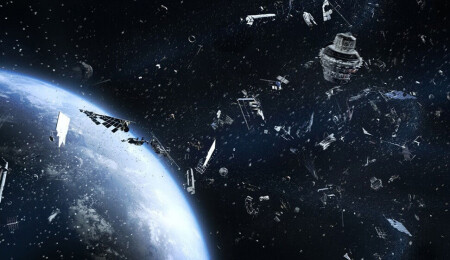Scientists warn: We may not find aliens because of space junk

Experts warned that until the end of this decade, astronomers will not be able to observe and detect life in space, as the night sky is "overflowing" with satellites, preventing stars from appearing.

More than 8,000 satellites orbit the Earth. The number of satellites has quadrupled since 2019 alone. Estimates are that the number of satellites will continue to multiply in the future.
Globally, nearly 400,000 satellites have been approved to be sent to Low Earth Orbit, while SpaceX alone is preparing to launch 44,000 more satellites for the Starlink internet constellation.
Astronomers are trying to deal with the bright bands of light created by satellites drifting in front of the telescopes' optical field. Internet satellites can also interfere with sensitive radio telescopes.
Tony Tyson, professor of physics and astronomy at the University of California, says:
"When you go to a dark place and look up at the sky in 2030, you will see an extremely terrifying scene. The sky will be full of moving satellites, and even in a very dark sky, the number of stars you will see will be minimal. That's a big problem."
With great concern, the Royal Astronomical Society (RAS), the UK Space Agency and the Business Department held a Dark and Quiet Skies conference last week to call for regulation.
HUNDREDS OF THOUSANDS OF SATELLITES WITH THE POSSIBILITY
RAS Executive Vice President Robert Massey said the world is experiencing a "paradigm shift" in the use of space.
"It's really possible that we'll see hundreds of thousands of satellites in orbit by the end of these 10 years," Massey said.
INCOMING SIGNALS ARE DIFFICULT TO DETECT
Pointing out that it is getting harder and harder to receive signals from other civilizations, Massey said, "Obviously, searching for the origin of life can be a difficult task, but if you have an extremely signal-laden and noisy sky, detecting signals from other civilizations becomes even more difficult." said and continued:
"Unlike light pollution, you can't escape it because you can see the sky wherever you are on Earth.
I think it's also a matter of culture whether or not to leave it unchecked. I think getting to a point where satellites make up about 10 percent of the stars moving across the sky is quite disturbing, and it's damaging this natural landscape."


Comments
Attention!
Sending all kinds of financial, legal, criminal, administrative responsibility content arising from illegal, threatening, disturbing, insulting and abusive, humiliating, humiliating, vulgar, obscene, immoral, damaging personal rights or similar content. It belongs to the Member / Members.